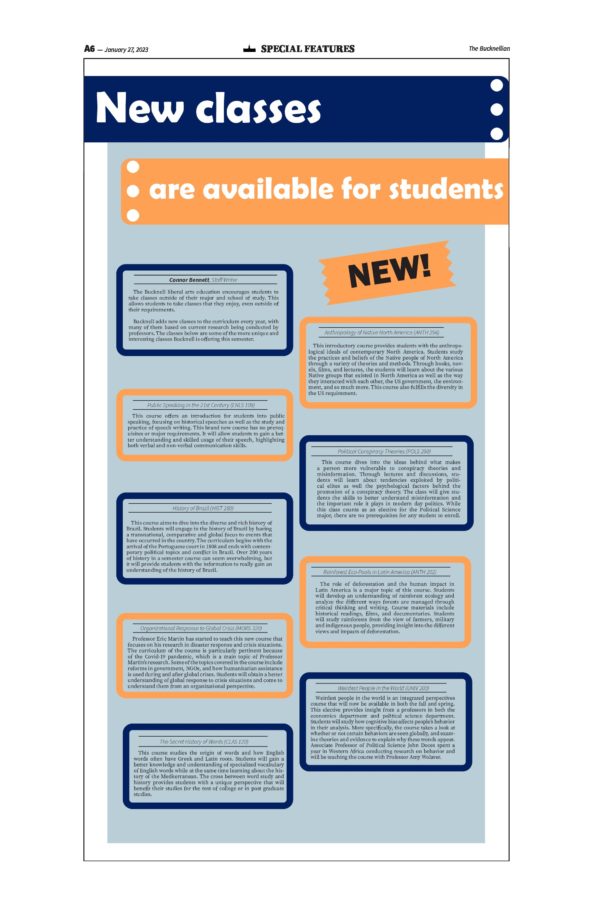New classes are available for students
January 27, 2023
The Bucknell liberal arts education encourages students to take classes outside of their major and school of study. This allows students to take classes that they enjoy, even outside of their requirements.
Bucknell adds new classes to the curriculum every year, with many of them based on current research being conducted by professors. The classes below are some of the more unique and interesting classes Bucknell is offering this semester.
Public Speaking in the 21st Century (ENLS 109)
This course offers an introduction for students into public speaking, focusing on historical speeches as well as the study and practice of speech writing. This brand new course has no prerequisites or major requirements. It will allow students to gain a better understanding and skilled usage of their speech, highlighting both verbal and non-verbal communication skills.
History of Brazil (HIST 280)
This course aims to dive into the diverse and rich history of Brazil. Students will engage in the history of Brazil by having a transnational, comparative and global focus to events that have occurred in the country. The curriculum begins with the arrival of the Portuguese court in 1808 and ends with contemporary political topics and conflict in Brazil. Over 200 years of history in a semester course can seem overwhelming, but it will provide students with the information to really gain an understanding of the history of Brazil.
Organizational Response to Global Crisis (MORS 320)
Professor Eric Martin has started to teach this new course that focuses on his research in disaster response and crisis situations. The curriculum of the course is particularly pertinent because of the Covid-19 pandemic, which is a main topic of Professor Martin’s research. Some of the topics covered in the course include reforms in government, NGOs, and how humanitarian assistance is used during and after global crises. Students will obtain a better understanding of global response to crisis situations and come to understand them from an organizational perspective.
Weirdest People in the World (UNIV 200)
Weirdest people in the world is an integrated perspectives course that will now be available in both the fall and spring. This elective provides insight from a professors in both the economics department and political science department. Students will study how cognitive bias affects people’s behavior in their analysis. More specifically, the course takes a look at whether or not certain behaviors are seen globally, and examine theories and evidence to explain why these trends appear. Associate Professor of Political Science John Doces spent a year in Western Africa conducting research on behavior and will be teaching the course with Professor Amy Wolaver.
Anthropology of Native North America (ANTH 256)
This introductory course provides students with the anthropological ideals of contemporary North America. Students study the practices and beliefs of the Native people of North America through a variety of theories and methods. Through books, novels, films, and lectures, the students will learn about the various Native groups that existed in North America as well as the way they interacted with each other, the US government, the environment, and so much more. This course also fulfills the diversity in the US requirement.
Political Conspiracy Theories (POLS 290)
This course dives into the ideas behind what makes a person more vulnerable to conspiracy theories and misinformation. Through lectures and discussions, students will learn about tendencies exploited by political elites as well the psychological factors behind the promotion of a conspiracy theory. The class will give students the skills to better understand misinformation and the important role it plays in modern day politics. While this class counts as an elective for the Political Science major, there are no prerequisites for any student to enroll.
Rainforests Eco-Politics in Latin America (ANTH 202)
The role of deforestation and the human impact in Latin America is a major topic of this course. Students will develop an understanding of rainforest ecology and analyze the different ways forests are managed through critical thinking and writing. Course materials include historical readings, films, and documentaries. Students will study rainforests from the view of farmers, military and indigenous people, providing insight into the different views and impacts of deforestation.






















